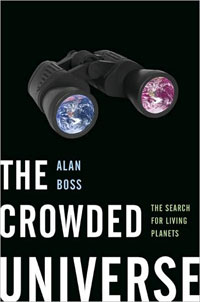Review: The Crowded Universeby Jeff Foust
|
| It seems that looking for planets around other stars, like so many other efforts, brings out a competitive streak in people. |
The strictly chronological approach that Boss takes—each section is datestamped—allows the reader to follow the flow of discoveries and other work in this field, although it can be a little jarring to go from a passage about a scientific discovery to one about the difficulties developing a spacecraft mission designed to study these worlds. In addition, the final few chronological entries are actually predictions of near-term events, like the launch of Kepler; the only clue is that they’re written in the future and not the past tense, something that might confuse people who read the book down the road.
Besides the obvious theme of exoplanet discovery, Boss weaves a secondary theme into the book: one of competition in the search for these worlds and understanding their nature. In various parts of the book he pits exoplanet pioneers Geoff Marcy and Paul Butler against Michel Mayor and Didier Queloz (and, later, others) in a race to see who would find the first and the most exoplanets; Kepler against a similar French spacecraft, CoRoT, in the hunt to find the first Earth-sized exoplanets (something Boss calls the “Extrasolar Planet Space Race”, likening CoRoT to Sputnik); and two models of solar system formation, called core accretion and disk instability, the latter championed by the author. It seems that looking for planets around other stars, like so many other efforts, brings out a competitive streak in people.
For those who have followed the field of exoplanet discovery in the last 15 years, there won’t be much new in The Crowded Universe: the science is covered at a very high level to make it accessible to the broadest possible audience. What makes the book useful is that it ties together not just the science but also the technical and political issues that make it possible (or, sometimes, impossible) to perform the science. Some of this content becomes digressions that add little to the story, like the tale of the “meteorite” that hit a New Jersey house in 2007; it turns out it’s a bit of space debris, perhaps from the upper stage of the Soyuz rocket that launched CoRoT a few days earlier. Others, though, will be enlightening even for those who more closely follow the field, such as when Boss recalls hearing a “strangely familiar” voice on a 2007 airline flight talking about NASA. That person turned out be former administrator Dan Goldin, who said little publicly about NASA after leaving the agency in 2001 but in this anecdote was expressing his concern about the fate of the Terrestrial Planet Finder missions that he championed when he led NASA but were now languishing. While the pace of exoplanet discoveries will quickly date this book, The Crowded Universe does offer a good way to quickly get up to speed on the state of and prospects for exoplanet research.
